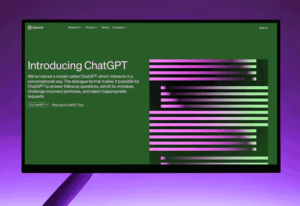ChatGPT is new artificial intelligence (AI) driven technology that has been in multiple news stories since its release in November 2022. Created by Open AI, an AI research lab, Microsoft announced a multi-billion dollar investment in the company early this year.
It’s technology that obviously holds promise for content creators of all kinds, but its impact can be much broader. Consider that people in professions of all kinds create content of various types—including HR professionals.
How ChatGPT Works
Daniel Armstong is the founder of Eleven Writing, a content writing agency. ChatGPT, he says, “feel like a leap ahead of the other tools we’ve seen before.” This, he says, is primarily due to its ability to handle follow-up questions. For instance, if the content generated is too “fluffy,” you can prompt it to “make this less fluffy and more formal.”
Because it’s AI-driven, the technology will learn and improve as you use it. “The more information the user provides to the AI, the better the results can be,” Armstrong says. “For instance, you can tell ChatGPT that you want your article to be a certain length, a certain voice, talk about specific sub-topics, and so forth. You can also feed it an example of your own writing so that it can mimic your style.”
HR professionals aren’t likely to be using AI to write articles, but there are a number of other applications that they could benefit from.
ChatGPT and HR
In January, SHRM’s work tech expert Tim Sackett shared some examples of how HR professionals could use ChatGPT technology. ChatGPT can, he says:
- Develop an entire recruiting strategy with very specific examples of inputs and outputs, along with a step-by-step guide to follow.
- Walk HR pros through the H1B process.
- Write HR policies.
- Write job descriptions.
Todd Mitchem, CEO of AMP Learning and Development, “says he has spent hours obsessively researching ChatGPT since the open-source tool went live in November.” He used it “to retool a leadership course that otherwise might have taken his team hours, or even days, to do”—after only about 15 minutes of prompts.
Potoula Chresomoales, SVP of Innovation at Skillsoft says that her company is already using and experimenting with AI and ChatGPT to automatically:
- Generate lesson descriptions.
- Write assessment questions to test learners’ knowledge.
- Curate content for specific customers.
- Generate personalized recommendations for learners.
That’s likely just the tip of the iceberg.
As with any too, though, there are some potential downfalls as well as benefits.
ChatGPT Potential Downfalls
Bias is one example. As Mary Faulkner writes in an article for HR Executive: “Amazon scrapped its screening tool early on because it found that the AI actively discriminated against female candidates, and a new law just went into effect in New York City that penalizes organizations found to have AI bias in their hiring processes.”
Accuracy is another. The technology behind ChatGPT uses search to gather information. Those results aren’t always necessarily accurate, current, or relevant. In fact, Google was likely chagrined to find that its initial announcement of its own AI chatbot—Bard—included a factual error.
New research suggests, though, that despite some potential for inaccuracy, ChatGPT actually does better than Google in some cases. Preply’s research found that:
- ChatGPT beats Google 23 to 16, with one tie.
- ChatGPT beats Google 14 to 8 on questions with medium or high stakes (when bad information can have negative consequences).
- Google excels on the most basic questions and questions where the information changes over time.
- On objective questions, ChatGPT wins 15 to 9, with one tie and subjectively ChatGPT wins 8 to 7.
Whichever tool is used, it’s important for people—HR pros in this case—to review the information generated to ensure its accuracy.
Chresomoales says: “As with any new technology, there is an adoption cycle where applications need to be refined and made fit for purpose. It’s early days for ChatGPT and Bard, and it will take time to address issues raised like gender bias, racial bias, political bias, and factually inaccurate results.”
Next Steps for HR
The most important thing HR pros can do right now is to experiment with ChatGPT and other similar tools—like Jasper. Think about the practical applications for content generation that are part of your workflow and try a few prompts to see what kind of content these tools can generate.
You’re likely to be pleasantly surprised.



